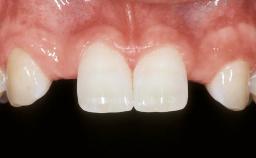
Immediate Implant - Immediate Temporary: Guided Surgery in the Esthetic Zone
In this video Dr. Nikos Mattheos demonstrates the full diagnostic, planning and treatment sequence of an immediate implant with an immediate prefabricated provisional restoration in the esthetic zone. A 28 years old female patient presents with discoloration and increasing mobility of tooth 11. Advanced stage of external resorption is diagnosed. Patient's high esthetic demands combined with intact gingival architecture and periodontal health makes her a good candidate for immediate placement and restoration to preserve the gingival contour. Surgical and restorative treatment is planned with digital workflow based on data from CBCT and intraoral scan. An immediate temporary crown is manufactured for placement at the day of the surgery. Flapless extraction is performed, and the implant placed with guided surgery. Consequently, the buccal gap of the socket is augmented with Xenograft, while the soft tissue space maintained with a collagen plug. Finally, a provisional crown is immediately placed on the implant with a titanium temporary abutment and an emax prefabricated crown.
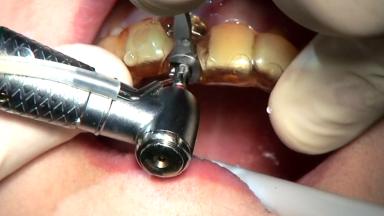
After watching this video, you should be able to...
- explain the main indications of immediacy in the aesthetic zone
- understand the main steps involved in the digital treatment plan of immediacy cases in the aesthetic zone
- identify the main surgical steps and procedures involved in extraction and flapless implant placement in the anterior maxilla
- discuss the main restorative challenges and procedures of such cases

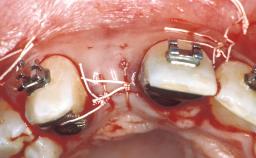
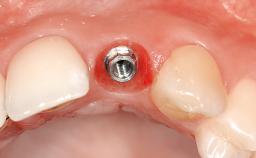
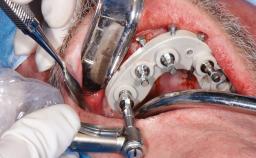
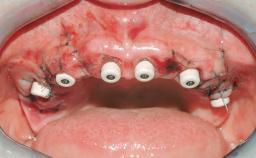
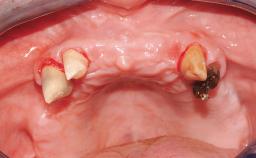
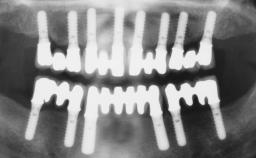
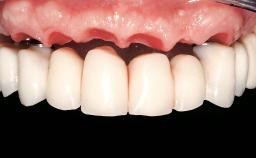
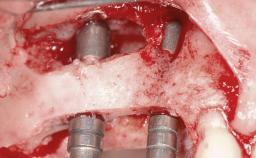
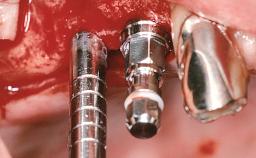
General Risk Assessment
Patient-related Factors
| Smoking Habit | None |
|---|---|
| Oral hygiene | Good |
| Compliance | Good |
| Patient's Expectations | High but achievable |
Patient-medical Factors
| Medical Status | Healthy, uneventful healing |
|---|---|
| Medical Fitness | Healthy, able to undergo planned anesthesia and surgical procedure (ASA I) |
| Medications | No medications that would negatively affect the surgical procedure and outcomes. |
| Radiation Treatment | None |
| Growth Status | Complete |
Site-related Factors
| Periodontal Status | No history of periodontal disease, or any active periodontal disease. |
|---|---|
| Access | Adequate |
| Pathology near the implant site | Condition that can be managed or does not need treatment |
| Previous surgeries in planned implant site | No previous procedures. |
Surgical Classification
Surgical Complexity
| Timing of placement | Immediate Placement (extraction sockets) (Type I) |
|---|---|
| Simultaneous or Staged grafting procedures | Implant placement as part of staged hard and/or soft tissue procedures |
Anatomy
| Bone Volume - Horizontal | Deficient but allowing simultaneous augmentation |
|---|---|
| Bone Volume - Vertical | Adequate |
| Keratinized Tissue | Sufficient (>4 mm) |
| Soft Tissue Quality | No scars or inflammation |
| Proximity to vital anatomic structures | Moderate risk of involvement |
Adjacent Teeth
| Papilla | Complete |
|---|---|
| Recession | Absent |
| Interproximal attachment | At CEJ |
Extractions
| Radicular morphology | Uniradicular |
|---|---|
| Available apical bone to achieve primary stability | Sufficient height ( ≥ 4 mm) and width (> 2 mm around apex of planned implant) |
| Socket walls | Intact |
| Thickness of buccal wall | less than 2 mm |
| Anticipated residual defect after implant placement | 2 mm or less |
Prosthodontic Classification
Complicating Factors
| Biological | Screw-retained restorations with appropriate contours |
|---|---|
| Mechanical/Technical | Presence of non-critical contributing factors |
Prosthesis Factors
| Prosthetic volume | Adequate. Space available for ideal anatomy of the restoration |
|---|---|
| Inter-occlusal space | Adequate. Capable to create an anatomically & functionally correct planned restoration |
| Volume and characteristics of the edentulous ridge (fixed) | Adequate. No adjunctive therapy or prosthetic soft tissue replacement will be necessary |
Esthetic Factors
| Gingival display at full smile | Medium |
|---|---|
| Shape of tooth crowns | Triangular |
| Restorative status of neighboring teeth | Virgin |
| Gingival Phenotype | Medium-scalloped, medium-thick |
| Bone level on adjacent teeth | 5.5 to 6.5 mm to contact point |
Occlusal Factors
| Occlusal scheme | User-defined occlusal scheme achievable |
|---|---|
| Involvement in occlusion | Minimal or no involvement |
| Occlusal parafunction | Absent |
Complexity
| Loading Protocol | Immediate |
|---|---|
| Implant-supported provisional restoration | Required, elevated esthetic and/or functional demands |
| Timing of placement | Immediate Placement (extraction sockets) (Type I) |
Esthetic Risk Assessment
Esthetic Risk Assessment
| Medical Status | Healthy, uneventful healing |
|---|---|
| Smoking Habit | None |
| Gingival display at full smile | Medium |
| Width of edentulous span | 1 tooth (≥ 7mm, standard diameter implant) 1 Tooth (≥ 6mm, narrow diameter implant) |
| Shape of tooth crowns | Triangular |
| Restorative status of neighboring teeth | Virgin |
| Gingival Phenotype | Medium-scalloped, medium-thick |
| Infection at implant site | None |
| Bone level on adjacent teeth | 5.5 to 6.5 mm to contact point |
| Thickness of buccal wall | less than 2 mm |
| Patient's Expectations | High but achievable |
Share this page
Download the QR code with a link to this page and use it in your presentations or share it on social media.
Download QR code